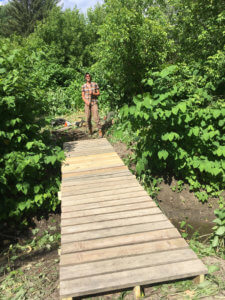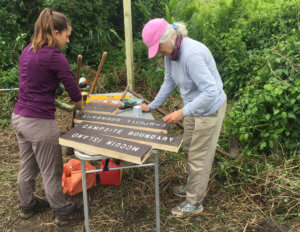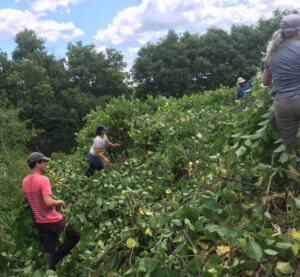 The Northern Forest Canoe Trail (NFCT) stewardship crew and community volunteers have completed projects along the Lamoille River that will improve safety and access for all users and minimize negative impacts on the environment.
The Northern Forest Canoe Trail (NFCT) stewardship crew and community volunteers have completed projects along the Lamoille River that will improve safety and access for all users and minimize negative impacts on the environment.
Highlights of the work include the construction of access steps and a removable, composting privy at a paddler campsite on McCuin Island, efforts to combat invasive species that threaten the island’s special ecological community, and the replacement of a bridge along a portage trail above Crossing Falls.
McCuin Island is a 3.8 acre island located in the Lamoille River, above Dog Head Falls in Johnson. The island, characterized by permanent and undisturbed vegetation, provides valuable wildlife habitat and is home to a unique assemblage of plants. In 2018, as part of its Lamoille River Paddlers’ Trail effort, the Vermont River Conservancy purchased McCuin Island and conveyed it to the town of Johnson to be managed as a preserve and as a stopping point along the Lamoille River Paddlers’ Trail.
 NFCT also partnered with the Johnson Conservation Commission to remove Japanese Knotwood and honeysuckle on McCuin Island. Volunteers joined the NFCT’s stewardship team for parts of the project as well.
NFCT also partnered with the Johnson Conservation Commission to remove Japanese Knotwood and honeysuckle on McCuin Island. Volunteers joined the NFCT’s stewardship team for parts of the project as well.
“This work is part of our partnership with the Lamoille River Paddlers Trail,” said Noah Pollock, NFCT’s stewardship director. “We’re always striving to improve access and minimize environmental impacts, and we believe these projects take important steps to accomplish both.”
Other stewardship projects included the replacement of a broken bridge along the Doghead Falls.
 “The carry around Doghead Falls is critical,” Pollock noted. “We got permission to put in a formal one, and rebuilt a bridge that provides for safe passage around that drop.”
“The carry around Doghead Falls is critical,” Pollock noted. “We got permission to put in a formal one, and rebuilt a bridge that provides for safe passage around that drop.”
This work was funded in part by a grant from the Lake Champlain Basin Program. To learn more about NFCT’s stewardship work, contact Noah Pollock at noah@northernforestcanoetrail.
This project has been funded in part by the United States Environmental Protection Agency under assistance agreement (LC 00A00707-0) to NEIWPCC in partnership with the Lake Champlain Basin Program.